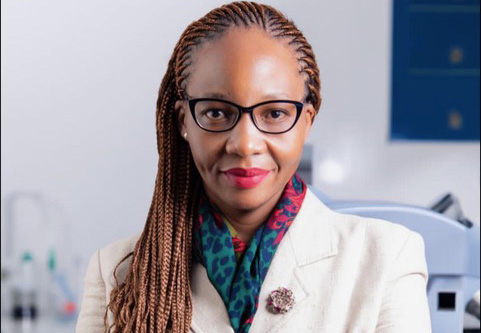Tuelo’s journey: building Botswana’s capacity for cutting-edge health research

Dr Tuelo Mogashoa, a Botswana-born scientist and PhD Fellow in the TAGENDI programme, is part of a growing movement of women shaping the future of global health research. Her journey reflects both a deep personal commitment to solving public health challenges and the transformative impact of initiatives designed to empower female scientists in Africa.
Science with purpose
Tuelo speaks about her work with a blend of warmth and determination that makes clear her research is more than an academic pursuit. “I’ve always been passionate about science,” she says. “As I grew older, my interest in health research deepened. To me, it offers a meaningful opportunity to contribute — albeit in small ways — toward solving global health challenges, particularly in high-burden settings like my home country, Botswana.”
Her educational journey laid the foundation for this passion. With a Bachelor of Science in Biochemistry and Microbiology and a Master of Philosophy in Medical Sciences, Tuelo combined a love of the laboratory with a deep concern for public health. These experiences, she explains, “shaped my early career and strengthened my drive to pursue health research.”
Advancing the fight against drug-resistant TB
Now in the final year of her PhD, Tuelo is writing her thesis while focusing on some of the most pressing issues in infectious diseases. “In the first year, I focused mainly on doing the laboratory work, such as culturing of Mtb isolates and collecting patient clinical data from data management systems,” she recalls. “Since then, I have received advanced training in bioinformatics, data management and data visualisations and grant writing. My research has steadily moved towards generating actionable insights needed to advance control of drug-resistant TB.”
This shift from purely laboratory work to data-driven insights mirrors her broader goal of strengthening Botswana’s ability to understand and respond to tuberculosis — still a major health challenge in the region.
Transformative impact of the TAGENDI Fellowship
In 2020, EDCTP2 launched a dedicated PhD fellowship scheme aimed at supporting women in health research across sub-Saharan Africa. Coordinated by the EDCTP Networks of Excellence, this initiative received funding from the UK National Institute for Health and Care Research (Department of Health and Social Care). Tuelo was among the 32 researchers who benefited from this initiative.
She credits the TAGENDI Fellowship with helping to accelerate her development as a researcher. “I was attracted to the TAGENDI PhD programme supported by EDCTP because of its strong focus on advancing health research in Africa and its emphasis on building capacity for innovative solutions to global health challenges, specifically for female scientists in Africa,” she says. “Participating in the TAGENDI programme has significantly enhanced my professional development by providing me with rigorous training in research methodologies, exposure to cutting-edge technologies, and opportunities to network with leading experts.”
She highlights several ways this fellowship programme has supported her trajectory: dedicated research funding and infrastructure, including travel to state-of-the-art facilities; access to advanced technologies and brilliant mentors; attendance at advanced methodological short courses; travel to international conferences such as AIDS, IAS and CROI to share her findings; support to publish her work in peer-reviewed journals; and an opportunity to collaborate with other female scientists in the region. “This fellowship has enabled me to collaborate with fellow female scientists in the Southern African region who are also interested in TB genomics,” she notes.
Overcoming barriers for women in science
Despite her achievements, Tuelo remains candid about the systemic obstacles facing women in science. “Women face challenges that are structural, personal and cultural in nature,” she says. “Work-life balance is often a challenge because women are often primary caregivers for their children and have a responsibility of taking care of the household; this in turn reduces the number of hours in the lab. Cultural stereotypes that science belongs to men can often erode women’s confidence and invite harsher scrutiny of female scientists.”
She believes real progress is possible if institutions act intentionally. “Creating an inclusive environment for women by allowing flexible work arrangements (part-time positions, protected writing block), provision of on-site or subsidised childcare facilities, and equitable research funding mechanisms where a proportion of grants can be reserved for early-career women investigators,” she suggests.
A vision for the future
Tuelo’s vision extends far beyond her own research. “Upon completion of my fellowship, I aspire to transition into an independent research role as a principal investigator in a research institution,” she says. She hopes to lead her own group, expand whole genome sequencing and bioinformatics capacity in Botswana, and translate research into policy by partnering with national health programmes to improve TB diagnostics.
Just as importantly, she plans to invest in the next generation of scientists. “I would also like to build local research capacity by delivering training workshops in molecular diagnostics as well as mentoring undergraduate and graduate students. Ultimately, I would like to leave behind a legacy of robust research infrastructure and a vibrant community of African scientists who are well-trained and able to tackle emerging infectious diseases.”
Advice to the next generation
Her message to aspiring female scientists is both practical and empowering. “Seek multiple mentors, build professional networks and/or collaborations, and enhance your core competencies to ensure your skill set remains in high demand,” she advises. “As women, they should also advocate for equitable work environments and help transform institutional cultures, thereby paving the way for the next generation of female scientists.”
Through her research, leadership, and commitment to mentorship, Dr Tuelo Mogashoa is steadily contributing to the fight against drug-resistant tuberculosis, while also helping to build a stronger, more inclusive future for health research in Botswana and beyond.
